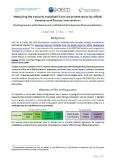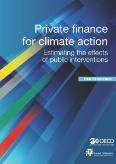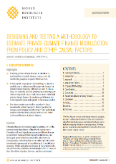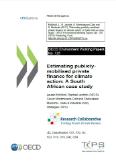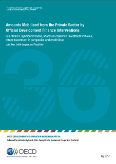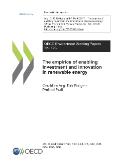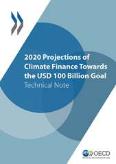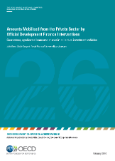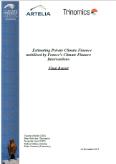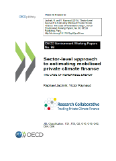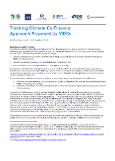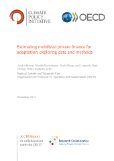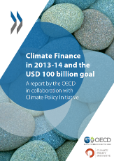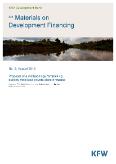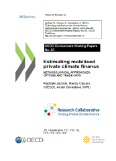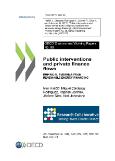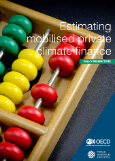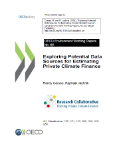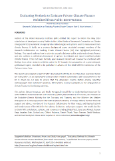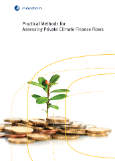Research Collaborative › Events and news
Events and news
|
19 March 2019 |
Release of “Tracking finance flows towards assessing their consistency with climate objectives” Achieving a low-GHG development requires making finance flows consistent with this objective. To measure progress to date and inform future public action in this area, this working paper calls for further efforts to track gross primary investments flows in new infrastructure and equipment and the refurbishment of such assets, as well underlying sources of finance. As a first step to better cover the targeted scope, countries could undertake pilot studies, making use of official, commercial and country-specific data sources as well as estimation methods. The proposed scope focuses on tangible fixed assets with a direct and significant impact on GHG emissions. It complements existing finance tracking initiatives, which mostly cover secondary transactions relating to stocks of publicly-traded financial assets (equities and bonds). |
|
10 April 2018 |
Joint Development Assistance Committee (DAC)-Research Collaborative working session in Paris To date, in close collaboration with bilateral and multilateral development finance institutions, DAC methodologies to measure private finance mobilised by official development finance have been developed and piloted for a first set of five instruments: guarantees, syndicated loans, equity shares in collective investment vehicles, direct investment in companies, and credit lines. The main objective of the working session was to discuss approaches for instruments not yet covered, namely: standard grants and loans extended in co-financing schemes; project finance schemes where multiple actors and instruments interact. The working session also dedicated time to consider how to reconcile different approaches for measuring mobilisation, as well as how to capture the more indirect or catalytic effect of other official interventions. The event gathered over 50 participants from development finance institutions as well as government agencies. |
|
3 November 2017 |
Release of “Private finance for climate action: Estimating the effects of public interventions” This Policy Perspectives summarises work conducted since 2013 on estimating publicly-mobilised private finance. The brochure first introduces a typology of the potential effects that public interventions and enabling conditions have on private finance. It then provides an overview of the state of play on methodologies:
On both aspects, the brochure puts forward possible next steps for improving data availability and methodologies. |
|
11 October 2017 |
Release of two working documents by the Research Collaborative Secretariat Tracking climate-related export credits: official reporting practices, methodological options and implications through project examples : This working document was prepared jointly by the Research Collaborative Secretariat, Austria and Denmark. It explores options to account for export credits and their possible mobilisation effect in the context of climate finance reporting. Such options are illustrated through four case study examples. The “Investor Perspective” for estimating publicly-mobilised private finance for climate action: methodological proposal and case studies : This working document puts forward a proposal for an approach to measure private finance mobilised by public finance and financial support resulting from policies. The approach was initially piloted in the context of a case study in South Africa, and is tested in this document for a further five examples. Both working documents were initially prepared for the 11 September 2017 workshop of the Research Collaborative, and have been revised to incorporate comments received. |
|
20 September 2017 |
Release of “Designing and Testing a Methodology to Estimate Private Climate Finance Mobilization from Policy and Other Causal Factors” This working paper by the World Resources Insitute (WRI) proposes a qualitative methodology to estimate private climate finance mobilisation by policies and other factors. The approach uses survey responses from governments and the private sector to assign weightings to pre-defined causal factors which are applied to estimate and attribute mobilised private finance. Three project-level case studies are explored to test the approach: sustainable transport in Brazil, geothermal energy in Kenya, and wind power in Uruguay. This working paper contributes to the body of work under the Research Collaborative that explores options for estimating the effect on private finance of policies, capacity building activities and other factors. It also complements ongoing efforts to develop methodologies for estimating private finance mobilisation by public finance instruments. Further details on these areas of work can be found on the Research Collaborative activities plan. |
|
11 September 2017 |
Tenth Research Collaborative workshop in Paris The tenth Research Collaborative workshop attracted approximately 60 participants from 22 countries, 7 bilateral and multilateral institutions, 7 research organisations, and the UNFCCC Secretariat. Morning sessions provided an opportunity for the OECD DAC and MDBs to update on methodologies for measuring private finance mobilised by development finance. Afternoon discussions focused on possibilities, both quantitative and qualitative, for assessing the effect on private finance of policies and capacity building interventions. A roundtable update by donor countries and presentation by Colombia highlighted domestic efforts on tracking private climate finance and enabled peer discussion and learning. Further, a technical session was dedicated to exploring options for reporting export credits in the context of climate finance. |
|
31 August 2017 |
Release of “Estimating publicly-mobilised private finance for climate action: A South African case study” This OECD and Trade & Industrial Policy Strategies (TIPS) working paper estimates and analyses publicly-mobilised private finance for climate action in South Africa between 2010 and 2015. The mobilisation effect of public finance is first estimated through an analysis of co-finance data. A pilot-methodology (the “investor perspective”) then expands the analysis to incorporate the role of financial support provided by policies in the renewable energy and energy efficiency sectors. Results suggest that domestic public actors play a key mobilisation role by providing financial support through policies and, to a lesser extent, project-level co-finance. However, further methodological work is required to estimate the effect of upstream public interventions such as capacity building activities, non-monetisable policies and public finance through intermediaries (funds and credit lines). |
|
30 August 2017 |
Release of “Amounts Mobilised from the Private Sector by Official Development Finance Interventions” This working paper presents the results from the 2016 survey conducted by the OECD Development Assistance Committee (DAC) to measure amounts mobilised from the private sector in 2012-2015 by official development finance interventions, including for climate-related activities. The survey covers guarantees, syndicated loans, shares in collective investment vehicles, direct investment in companies, credit lines. The results indicate that during 2012-2015 USD 81.1 billion was mobilised from the private sector, mainly through guarantees for which the amounts mobilised represented 44% of the total. They also show that most of the amounts mobilised supported projects in middle-income countries (77%), especially in Africa which was the main beneficiary region (30%). More information can be found on the OECD DAC webpage. |
|
31 May 2017 |
Release of “The empirics of enabling investment and innovation in renewable energy” Based on new econometric analysis, the working paper assesses the impacts of climate mitigation policies and of the quality of the investment environment on investment (as well as on patenting activity) in renewable-power generation since 2000 in OECD and G20 countries. The analysis also assesses how the investment environment and related policy misalignments influence the effect of climate mitigation policies in encouraging renewables investment. In doing so, the report contributes to an emerging body of work that explores evidence-based options for estimating the effect of policies on investment. Such work complements continued progress being made in measuring and reporting private finance mobilised by public climate finance. Information about this range of activities is available from the Research Collaborative’s current activities plan. |
|
13 March 2017 |
Research Collaborative workshop in Paris The ninth Research collaborative workshop attracted over 70 representatives from countries, development finance institutions, and research. Discussions covered on-going efforts to measure private finance mobilised by development finance as well as to estimate the catalytic effect of capacity building and policy interventions, including in the context of country-level pilot study of publicly-mobilised private finance for climate action in South Africa. A session was also dedicated to building a better understanding of the role played by export credits in climate finance. |
|
8 November 2016 |
Side event at the UNFCCC twenty first Conference of Parties (COP22) in Marrakesh The OECD Development Assistance Committee and the Research Collaborative will jointly host a side event on 8 November, which will feature recent achievements, on-going initiatives and collaborations in tracking public and private climate finance, as well as highlight inter-linkages and synergies with frameworks and methods to track finance for development. The event will feature presentations and interventions by the Inter-American Development Bank, the South African Department of Environmental Affairs (tbc) and the Danish Ministry of Foreign Affairs, as well as the OECD.
|
|
17 October 2016 |
Release of “2020 Projections of Climate Finance Towards the USD 100 Billion Goal” A number of developed countries and multilateral institutions have made significant forward looking climate finance pledges. On that basis, the OECD was asked to provide analytical support to the preparation by developed countries of a roadmap towards achieving the USD 100 billion climate finance goal. This technical note sets out the resulting projections for climate finance in 2020 along with the underlying assumptions and methodologies used. The projected overall range is driven by the level of public finance but is conditional on the fraction of projects likely to mobilise private finance as well as the corresponding private-public finance ratio. |
|
12-13 September 2016 |
Joint Research Collaborative - Development Assistance Committee (DAC) workshop in Paris Recognising inter-linkages and need for further synergies between frameworks and methods to track finance for climate and development, the aim of this workshop was twofold. First, it informed climate finance policy practitioners of progress in measuring public and private finance for development - in particular through the Total Official Support for Sustainable Development (TOSSD) measure being developed – and to facilitated a discussion on implications for climate finance tracking. Second, it took stock of progress and next steps in measuring climate finance, and in particular data and methodological developments for measuring publicly-mobilised private finance. The event brought together close to 100 climate and development finance experts from countries, development finance institutions and research organisations. |
|
16 March 2016 |
Joint OECD Development Assistance Committee (DAC) and Research Collaborative working session in Paris With the aim of ensuring synergies and convergence of approaches, the DAC and Research Collaborative are joining efforts to develop methodologies for measuring private finance mobilised by a range of development finance instruments and mechanisms beyond those for which the DAC already developed methodologies (guarantees, syndicated loans and equity shares in funds). A joint working session was hosted to this end. It gathered experts from twelve bilateral and multilateral development finance institutions, and focused on discussing methodologies for credit lines, direct investments in companies, as well as in the context of complex project finance structures. |
| 14 March 2016 |
Research Collaborative workshop in Paris The Research Collaborative hosted its seventh workshop with record attendance from over 70 participants from 20 countries, 11 bilateral and multilateral development finance institutions, and 10 research organisations and think tanks. The workshop made it possible to share information about recent achievements and identify remaining work ahead for improving the accuracy and comprehensiveness of estimates of publicly-mobilised private finance for climate action in developing countries. Participants reflected on what is currently practically feasible, as well as discussed short-, mid- and long-term actions and collaborations being undertaken towards better data and methodologies. Many of these are reflected in the Research Collaborative’s current activities plan. |
|
10 February 2016 |
Release of “Amounts Mobilised from the Private Sector by Official Development Finance Interventions: Guarantees, syndicated loans and shares in CIVs” In 2015 the OECD Development Assistance Committee (DAC) carried out a survey to i) pilot methodologies proposed for measuring private finance mobilised by guarantees, syndicated loans and shares in common investment vehicles (CIVs), ii) assess the feasibility of collecting activity-level data on amounts mobilised, and iii) collect data on amounts mobilised from the private sector through these mechanisms over the period 2012-14. This DAC working paper presents the results from this survey, including for climate-related activities. As from 2017, reporting on amounts mobilised will be included in the regular DAC data collection, which will initially cover the above three mechanisms. Work is underway to develop methodologies for other major mechanisms mobilising private finance. More information about this on-going work can be found on the DAC webpage. |
|
January 2016
|
Release of donor country pilot studies of mobilised private climate finance Four donor countries – namely, Denmark, France, Norway and Belgium – have published pilot studies of private finance mobilised for climate action in developing countries as a result of their own multilateral and/or bilateral interventions. Each report sets out estimates of mobilised private climate finance over a one to two year period between 2013 to 2014, alongside key methodological assumptions, using the four-stage framework of decision points and methodological options as a basis, and lessons/experience that can be drawn from this exploratory analysis. |
|
18 December 2015 |
Release of “Sector-level approach to estimating mobilised private climate finance: the case of renewable energy” This OECD working paper explores the extent to which currently-available secondary data make it possible to estimate private finance mobilised by developed countries for renewable energy projects in developing countries. Findings underline the need for improved primary data collection, in particular by public climate finance providers on private co-finance, building upon the recent progress already achieved in this area. The paper also highlights that very careful and transparent use should be made of private finance leverage ratios, as they are highly sensitive to both the underlying calculation methods as well as to core characteristics of public finance that result from varying mandates of development agencies and institutions. |
|
8 December 2015 |
Side events at the UNFCCC twenty first Conference of Parties (COP21) in Paris The OECD Development Assistance Committee and the Research Collaborative jointly hosted a side event on December 1, which outlined initiatives and collaborations in tracking public and private finance for climate action in developing countries. It included presentations by the OECD, the World Bank, the civil society organisation Grupo de Financiamiento Climático para América Latina y el Caribe, as well a panel intervention by the Swiss delegation to the UNFCCC. The Research Collaborative was also invited to contribute to the following events: Further information about OECD at UNFCCC COP21. |
|
4 December 2015 |
Release of “Tracking Climate Co-Finance: Approach Proposed by MDBs” A consortium of multilateral development banks (MDBs) has jointly reported their investments in climate change adaptation and mitigation projects (“climate finance”) on an annual basis since 2011. The approach outlined in this briefing document seeks to expand the MDB climate finance tracking to also start estimating financial resources invested alongside MDBs by external parties. A Technical Working Group composed of MDB representatives, supported by an external consultant (International Financial Consulting Ltd), launched work towards a common practice in early 2015. The methodology described in this document does not focus on measuring or on attributing private finance mobilisation, but on reporting all resources contributed by external entities (both public and private) alongside MDB climate finance. |
|
20 November 2015
|
Release of the report "Estimating mobilized private finance for adaptation: exploring data and methods” This report, published by Climate Policy Initiative (CPI) in collaboration with the OECD, advances understanding of how to assess publicly-mobilised private investment in climate resilience. It does so by developing, testing and evaluating a range of methodological options to estimate the amount of private finance mobilised by developed countries’ public finance interventions for climate adaptation in developing countries. While on-going climate finance tracking efforts focus on measuring private finance mobilised directly, this study also explores possibilities to estimate private finance mobilised indirectly by e.g. by public finance for capacity building or project demonstration. |
|
7 October 2015
|
Release of "Climate Finance in 2013-14 and the USD 100 billion goal” This OECD Study, in collaboration with Climate Policy Initiative, provides an aggregate estimate of public and mobilised private climate finance by developed countries for climate action in developing countries, based on a transparent methodological framework. The estimate reaches USD 62 billion in 2014, up from USD 52 billion in 2013 and making an average of USD 57 billion annually over the 2013-14 period. Building upon the work conducted under the Research Collaborative to date, mobilised private finance, which accounts for 26% on average, was estimated based on private co-financing data from bilateral and multilateral development finance institutions as best-available evidence of mobilisation,. The report was prepared at the request of the Peruvian and French governments in the context of their responsibilities as the current and incoming presidencies of the UNFCCC Conference of Parties (COP). Climate finance flows are an important element of the negotiations in the lead up to COP21 in Paris, where countries are expected to finalise a new universal agreement on responses to climate change beyond 2020. |
|
9 September 2015 |
Research Collaborative workshop in Paris Presentations and discussions focused on progress of and synergies among the various on-going pilot studies of mobilised private climate finance conducted by the OECD, Climate Policy Initiative, bilateral development finance institutions, multilateral development banks and individual donor countries. Close to 60 participants attended from 8 research organisations and consultancies, 10 development finance institutions, 16 government delegations, and the UNFCCC and UNDP Secretariats. |
|
24 August 2015 |
Release of a technical paper “Proposal of a methodology for tracking publicly mobilized private climate finance” This paper was drafted by members of the staff of KfW Development Bank to describe a proposal for a technical methodology to track the impact public finance interventions have in mobilising private capital for climate action in developing countries. The methodology was developed for, and voluntarily pilot tested by members of a group of bilateral development finance institutions (coordinated by KfW) and consequently reflects the requirements and norms to the practice of development finance. Using the four-stage framework of key decision points developed by the Research Collaborative, the paper outlines the specific elements of the methodology and the rationale for the approach taken, as well as introduces a brief discussion of overarching issues relevant to each decision point. In addition, the paper provides aggregate (though not official) results from the pilot tracking by the group of bilateral development finance institutions, some lessons learned as well as an outlook for the future, acknowledging that the methodology and results represent an early effort to track publicly mobilised private climate finance. A number of other on-going activities by researchers, multilateral development banks and countries will result in complementary outputs being released during the next months. |
|
28 April 2015 |
Presentation at a meeting of the EU’s Energy and Climate Change Working Group, Brussels In the context of a meeting focused on International Climate Finance, the Research Collaborative presentation provided an overview of progress to date, outputs to COP21 and expectation management. This was an opportunity to raise awareness about the work of the Research Collaborative and of its collaborating partners, as well as about some of the remaining hurdles towards producing more robust and comprehensive estimates of mobilised private climate finance. |
|
16 March 2015 |
Research Collaborative workshop in Paris The various stakeholders involved in the Research Collaborative shared information about on-going and planned pilot studies of mobilised private climate finance at different levels, and thereby identified as well as discussed co-operation needs and possible synergies. 56 participants attended from 6 research organisations, 9 development finance institutions, 15 country delegations, and the UNFCCC Secretariat. |
|
4 March 2015 |
Publication of the report “Estimating mobilised private climate finance: methodological approaches, options and trade-offs” This joint OECD-World Resources Institute report places Research Collaborative findings from work conducted to date both on approaches to estimating mobilisation and on the availability of underlying private climate finance data within an overarching framework. This framework steps through key decision points involved in estimating publicly mobilised private climate finance and assesses a range of methodological options to address these. Based on this assessment, the analysis:
The intent is to help guide on-going and future efforts to further develop, implement and test different methodological approaches, including through pilot measurements of mobilisation by countries, public finance institutions, and/or researchers. Key messages are summarised in a Policy Perspectives: Estimating mobilised private climate finance. |
|
12 February 2015 |
Release of the OECD report “Public Interventions and Private Climate Finance Flows: Empirical Evidence from Renewable Energy Financing” This study explored the potential development and use of econometric techniques towards estimating publicly mobilised private finance in the renewable energy sector. The report:
The methodology proposed is an initial attempt to estimate private climate finance mobilisation empirically. It should be seen as a step towards developing more comprehensive methodologies for analysing and estimating private finance mobilisation in the global climate policy context. This analysis as well as other work conducted to date fed into the preparation of a soon to be published joint OECD-World Resources Institute report synthesising learnings to date, based on which key messages were summarised in a Policy Perspectives: Estimating mobilised private climate finance ure released ahead of COP20 in Lima. |
|
4 December 2014 |
Side event at the UNFCCC twentieth Conference of Parties (COP20) in Lima The Research Collaborative, together with the OECD Development Assistance Committee (DAC), hosted a side event on “Tracking public and private climate finance: towards improved data and increased transparency”, on 4 December at the European Union pavilion. With the objective to outline and discuss recent achievements and on-going initiatives as well as collaborations in tracking climate finance, the event included presentations and updates from the DAC, the Research Collaborative, international finance institutions, country delegates and non-governmental representatives. Further information about OECD at UNFCCC COP20. |
|
17 November 2014 |
Release of "Policy Perspectives: Estimating mobilised private climate finance" This Policy Perspectives summarises key messages towards estimating private climate finance mobilised by public interventions. These broadly consist of:
This summary is based on a forthcoming joint OECD and World Resources Institute report. The report places Research Collaborative findings from activities conducted to date both on approaches to estimating private climate finance mobilisation and on the availability of underlying climate-specific private finance data within an overarching framework. This framework proposes a range of methodological options to address key decision points for estimating publicly mobilised private finance. The intent is to guide the development and use of more robust methodologies as well as to inform future work by relevant actors, including pilot measurements. |
|
24 September 2014 |
Release of the report “PILOT - Tracking Mobilised Private Climate Finance” for the Netherlands
The study was authored by Triple E Consulting and commissioned by the Ministry of Foreign Affairs of the Netherlands. It is a contribution to Work Stream 3 of the Research Collaborative: ‘Pilot measurements and ground-testing of methodologies’. The report consists of a trial calculation of mobilised private climate finance by Dutch public finance in 2012 and of a tentative estimate of mobilisation for the 2015 budget. It describes and makes use of a possible estimation method, summarises the underlying definitional and methodological choices made, as well as highlights the issues and uncertainties encountered in this process, in particular in relation to data availability and attribution of mobilisation. The information and views set out in this study are those of the authors at Triple E Consulting and do not reflect the official opinion of the Ministry of Foreign Affairs of the Netherlands. |
| 21 September 2014 | Presentation at a ministerial meeting on climate finance mobilisation in New York
Ministers and senior officials from over a dozen donor countries met in New York as part of the third meeting of the Climate Finance Mobilisation process. The process is an on-going dialogue on how to enhance and accelerate the scale up and mobilisation of climate finance for low-emission and climate-resilient activities in developing countries. Along with public financial institutions (multilateral development banks, development finance institutions, and export credit agencies) that provided an update on their climate finance efforts, the Research Collaborative presented emerging findings from its technical work towards improved data and methods to estimate mobilised private climate finance. A chair's summary of the meeting is available. Download the Research Collaborative presentation. |
| 15 September 2014 | Research Collaborative workshop in Paris
The event allowed participants to review the overall status of the Research Collaborative and of individual research activities, discuss the draft of the upcoming synthesis report of learnings to date, as well as view and prioritise options for future work. 53 participants attended from 11 research organisations, 8 development finance institutions, 16 country delegations, and the UNFCCC Secretariat. |
|
10 July 2014 |
Release of the report “Exploring potential data sources for estimating private climate finance”
The report was authored by Randy Caruso and Raphaël Jachnik (OECD) as a core contribution to Work Stream 1 of the Research Collaborative: ‘Private climate finance mapping, data assessment and tracking methods’. It reviews a number of commercial and public data sources to examine their potential for increasing coverage and understanding of the volume and characteristics of private climate finance beyond renewable energy projects. The analysis finds that the reviewed databases capture a vast amount of at least partial data on private finance, investment and instruments in climate-relevant sectors. It however also identifies and illustrates a number of limitations that complicate efforts to use these databases to meaningfully identify, isolate and characterise climate-specific private finance. Potential ways forward to mitigate, though not fully overcome these limitations are put forward for consideration by policy-makers and researchers. Results from this analysis are being combined with findings from other completed and on-going research activities under the Research Collaborative towards the preparation of a synthesis report of learnings to date on methods to estimate mobilised private climate finance. |
|
27 June 2014 |
Release of the report “Evaluating Methods to Estimate Private Climate Finance Mobilised from Public Interventions”
The study was authored by Aman Srivastava and Shally Venugopal, from the World Resources Institute (WRI). The analysis qualitatively tested a range of existing methodologies used to report private climate finance mobilised by public finance at the project level, and further investigated the mobilisation impacts of public interventions at the broader policy and market development levels. Challenges identified were then captured through the design of an analytical framework that aims to guide donors and reporting institutions in the development of more robust methodologies for measuring and reporting private climate finance mobilisation. Results from this analysis will be combined with findings from other research activities under the RC towards the preparation of a synthesis report of learnings to date, intended to be published in advance of the 2014 UNFCCC Conference of the Parties in Lima, Peru. |
| 8 June 2014 | Presentation at a UNFCCC side event on the Biennial assessment and overview of climate finance flows, Bonn
The Research Collaborative, together with the OECD Development Assistance Committee, participated and presented at a side event hosted by the UNFCCC Standing Committee on Finance (SCF) during the Bonn Climate Change Conference. The purpose of the side event was for the SCF to provide an update on the progress made on the preparation of the first Biennial Assessment and Overview of Finance Flows, and to further engage with Parties and relevant stakeholders on ways to advance work in the area of climate finance tracking. Download the joint Research Collaborative-OECD DAC presentation. |
| 17 March 2014 | Research Collaborative workshop in Paris
The workshop allowed participants to share and discuss emerging results as well as on-going research, ensure co-ordination across activities, discuss remaining research gaps, and consider outreach opportunities and needs for 2014. Download the introductory presentation which includes emerging common threads across research activities. |
|
10 February 2014
|
Publication of the report “Practical Methods for Assessing Private Climate Finance Flows”
The study has been carried out by Gaia Consulting Ltd and the Overseas Development Institute (ODI) for NOAK, a working group for global climate negotiations under the Nordic Council of Ministers. The report illustrates a number of methodological options for measuring private flows mobilised by developed countries through their use of public finance instruments. It will be complemented by other on-going activities under the Research Collaborative investigating broader approaches for estimating mobilised private climate finance arising from the use of both direct (finance) and indirect public interventions (such as policies), as well as underlying market conditions. Download the report and view the full press release. |
| 15 November 2013 | Side event at the UNFCCC nineteenth session of the Conference of the Parties (COP19), Warsaw
The side event featured presentations and discussions of on-going activities and initial results, in particular on methods for measuring mobilisation of private climate finance. Read the programme and view the OECD introductory presentation as well as presentations made by Climate Bonds Initiative, the Zambia Institute for Environmental Management, the Overseas Development Institute and the World Resources Institute. Further information about OECD at UN Climate Change Conference (13-21 November 2013). |
| 17 September 2013 | Research Collaborative workshop, Paris
The meeting allowed participating researchers, development finance institutions and government delegations to both review the status of the project including joint research proposals and on-going work under each work stream, as well as to ensure co-ordination across research activities towards the targeted cohesive outputs. |
| 12 June 2013 | Research Collaborative meeting, Bonn
The meeting took place on the margins of the UNFCCC conference and negotiations. It allowed participants to jointly review progress made to date and discuss key next steps. |
| 10 April 2013 | Meeting of the European Commission’s Economic Policy Committee, Brussels
The project was presented to EC staff and EU countries delegates to the Working Group on Energy and Climate Change, as part of their discussions on the role of private finance for climate action. |
| 18 March 2013 | Research Collaborative workshop, Paris
The aim of this researchers’ focused workshop was to generate a collaborative work plan by breaking down the overarching work streams into project activities for consideration by donors. |
| 13-14 February 2013 | Research Collaborative workshop, Paris
This kick-off workshop allowedto discuss and review the objectives, scope, research questions, work streams and governance of the Research Collaborative. |
Related Documents


